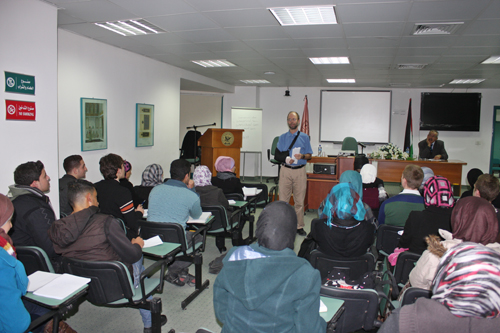The American Studies Resource Center at An-Najah Organizes a Workshop on Cross-Cultural Communication
On March 9th, the American Studies Resource Center at An-Najah University organized a workshop titled “Cross-Cultural Communications: American English and Arabic Speakers” at the Conferences Room at the Old Campus library.

The workshop’s keynote speaker was Dr. Lee Tesdell, Professor of international technical communication, online help systems, collaboration, teamwork and new media writing at Minnesota State University in the United States.
At the beginning of the workshop Dr. Ayman Nazzal, Director of the American Studies Resource Center at the University, welcomed Dr. Tesdell and valued his interest in presenting his speech at An-Najah about cross-cultural communication.
Dr. Tesdell on his part spoke about the importance of language as a tool for cross-cultural communication and mentioned the many obstacles that hinder or limit the communication process between people, resulting in misunderstanding between them.
Dr. Tesdell explained that among the most significant issues that face cultural communication is the fact that many countries are multilinguistic which means that people have to deal with several languages in order to communicate. Also, the difference in traditions and customs limit the strength of human communication.
Furthermore, Dr. Tesdell explained that body language is a cornerstone in cross-cultural communication and is a reliable tool that can eliminate any obstacles despite the existing differences between people with respect to language, culture or traditions. He also stressed the necessity to fight and reject other odd ways of writing and using language such as using Arabic letters to write English sentences or vice versa because such forms of writing negatively affect the content of the message carried between people.
Dr. Tesdell concluded by raising comparisons between different forms of communication, from the most primitive to the most advanced such as those used by indigenous people in Cambodia and Vietnam and those used in advanced societies around the world.



